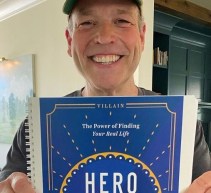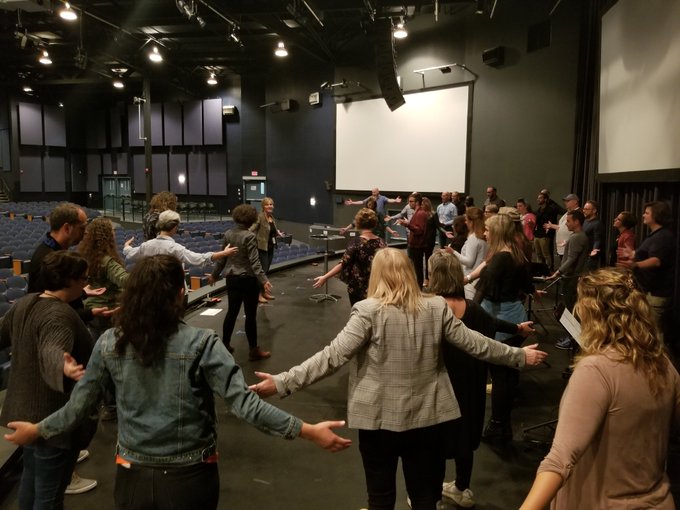During our daytrip last week, I ran into a member from my former, now-dismantled, church. The church was fairly large, so it’s not unusual to connect with someone. But it has become all-too-usual to feel some real loss when I do.

We had a lovely community, not long ago. I needed it then and I need it now. But community is hard to build if you’ve lost it. And it is even harder to rebuild once someone wrecks it. A lot us us have a lot of building to do.
I still don’t understand what life is like post-pandemic, but I know it changed. We’re more distant. And I really do not understand what is happening with U.S. politics, no matter how much I read and think about it. We’re strangely at one another’s throats. We need to get it together, as in face-to-face.
The lack of community can be jarring.
For instance, I decided to post part of Heather Cox Richardson’s column on Facebook last week. The portion I posted was mainly quotes by Donald Trump taken from an interview I found enlightening and disturbing.
My childhood neighbor and elementary school classmate commented:
Man what are you smokin’? If you believe all that clap-trap you need help.
I told my wife about this and she said, “He wrote that to his friend?” I tried to make an excuse for him, but it did not really work.
I replied to him — which I rarely do. I usually just take down self-incriminating things I think people will regret later (or I think they should regret). I said:
The “claptrap” in the excerpt were mainly quotes from Trump. I’ll leave your reply up, since we’re childhood friends (just looked at your class photo from [our elementary school]), but you did not really respond to what I posted.
I did not want to sound too defensive. But I was offended. I had not posted any commentary, just quotes, since I don’t always hear what Trump says and I thought others should just hear what he said. I’ve cast a lot of shade on Trump since 2015, but I wasn’t doing it this time. My friend replied:
Take it down, that’s what liberals always do but I guarantee you the country would be better off with Trump at the helm because the US will die a horrible death if Biden’s re-elected.
You might have examples of this kind of anti-community in your life, too.
How did we get so fragmented?
Researchers have a lot to say about our fragmentation. I’ve said a bit, too. But apart from why it is happening, we have to endure how it is happening.
- Churches feel distant. Many of them died or were hobbled during the pandemic.
- A lot of families are split up, even when they are together. 1.2 million people have died, so far, and are still dying from Covid. That means millions of people are still mourning. Six million children have or had long Covid; all the rest are also recovering from shock and from the loss of schooling. Mental health deteriorated so much in the past five years, it finally became a public topic. There are many reasons dissociation is a “thing.”
- All things public have been suspected of being dangerous or false for 4 years. Many people still won’t go inside a restaurant, get vaccines, or believe a government official.
- People think virtual groups and ideological corrals are community. They may provide like-minded connections, but they don’t build a society where free interchange and growth happens.
I can see why people who have been pastors, like me, die in the saddle. They want to be deeply embedded in a community. I decided to get out of the saddle, but I sure miss living and serving among people with whom I have built connections.
A person called me last week to see if we could get together and talk about what happened to the church and to me on the way out. They said, “I heard you got thrown out.” That is not completely true, the leadership just changed the agreement that allowed for me to stay a member of the body, but not lead. Instead, they sent me their policy saying I needed to be gone for a year and then they could discuss my return. I was already not employed by them, but I did not cause them a problem by maintaining my ties. They were well on the way to church suicide, anyway. The phone call last week, years later, was another reminder of what has been lost.

We need to build new community
My present little church I’m joining is still talking about getting back to what they were before the pandemic. I don’t think that is going to happen, but I can see why they long for it. I’m still lamenting the community I have lost, too.
But my experiences this week have encouraged me to change. I have four convictions I think the Spirit has inspired for me to follow.
1) Accept the community you have. When I was praying this morning, I again decided not to be arelational. I may not have the community I lost. But I have the one I have and I should live in it.
2) Build something on the foundation presently given, not on the past. I spent years living in something I loved. You probably felt deeply about the last twenty years, too, one way or another. Regardless, the patterns you made are familiar to you and you would hate to change them. I can relate. It is hard to think of changing and building at my age, but what else do humans do? And if you follow Jesus, there is no time you have followed enough. He’s moving.
3) Don’t give up on the unity of the Spirit. The history of the church is consistent. In all the bad times, good people get together and create new and sometimes radical responses to their lack of community (one of my favorite examples). I know most of the encampments now on college campuses are not built in the name of Jesus. But those people are having experiences of community they will never forget – I’ve danced a bit on the quad myself! New community can spring up.
4) Have an inner life that leads to an outer love. If you are more alone than ever, you are probably closer to God than ever, even if you don’t feel it. If we turn into our aloneness and let it do the work of revelation and integration, it will lead us to self-giving love. And that love is the heartbeat of community.

 In the middle of his desperation, God somehow revealed himself. She didn’t reveal herself through the church — the institution which had blessed the war and received the spoils. It was through nature. Whenever you see a lawn ornament of Saint Francis (and I have one in my living room, if you’d like to), there is always a bird perched on him somewhere and often a bunny at his feet. That’s much cuter than necessary, since his most spectacular association with animals is with a man-eating wolf. But it is a reminder that he sort of got the message straight from God, through the sun, moon, stars, fire and water.
In the middle of his desperation, God somehow revealed himself. She didn’t reveal herself through the church — the institution which had blessed the war and received the spoils. It was through nature. Whenever you see a lawn ornament of Saint Francis (and I have one in my living room, if you’d like to), there is always a bird perched on him somewhere and often a bunny at his feet. That’s much cuter than necessary, since his most spectacular association with animals is with a man-eating wolf. But it is a reminder that he sort of got the message straight from God, through the sun, moon, stars, fire and water.



 My main issue with not breaking free of virtuality has to do with community. When our therapist group was sharing I felt hungry for more togetherness and most of them voiced similar feelings. Let’s talk about cases. Let’s have dinner. Let’s build some love. We are starving. Yes, we are just coming out of the weirdest two years ever, perhaps. But our starvation is the future if we conform to the changes the pandemic accelerated. I think psychotherapy is best accomplished in the atmosphere of the
My main issue with not breaking free of virtuality has to do with community. When our therapist group was sharing I felt hungry for more togetherness and most of them voiced similar feelings. Let’s talk about cases. Let’s have dinner. Let’s build some love. We are starving. Yes, we are just coming out of the weirdest two years ever, perhaps. But our starvation is the future if we conform to the changes the pandemic accelerated. I think psychotherapy is best accomplished in the atmosphere of the 











